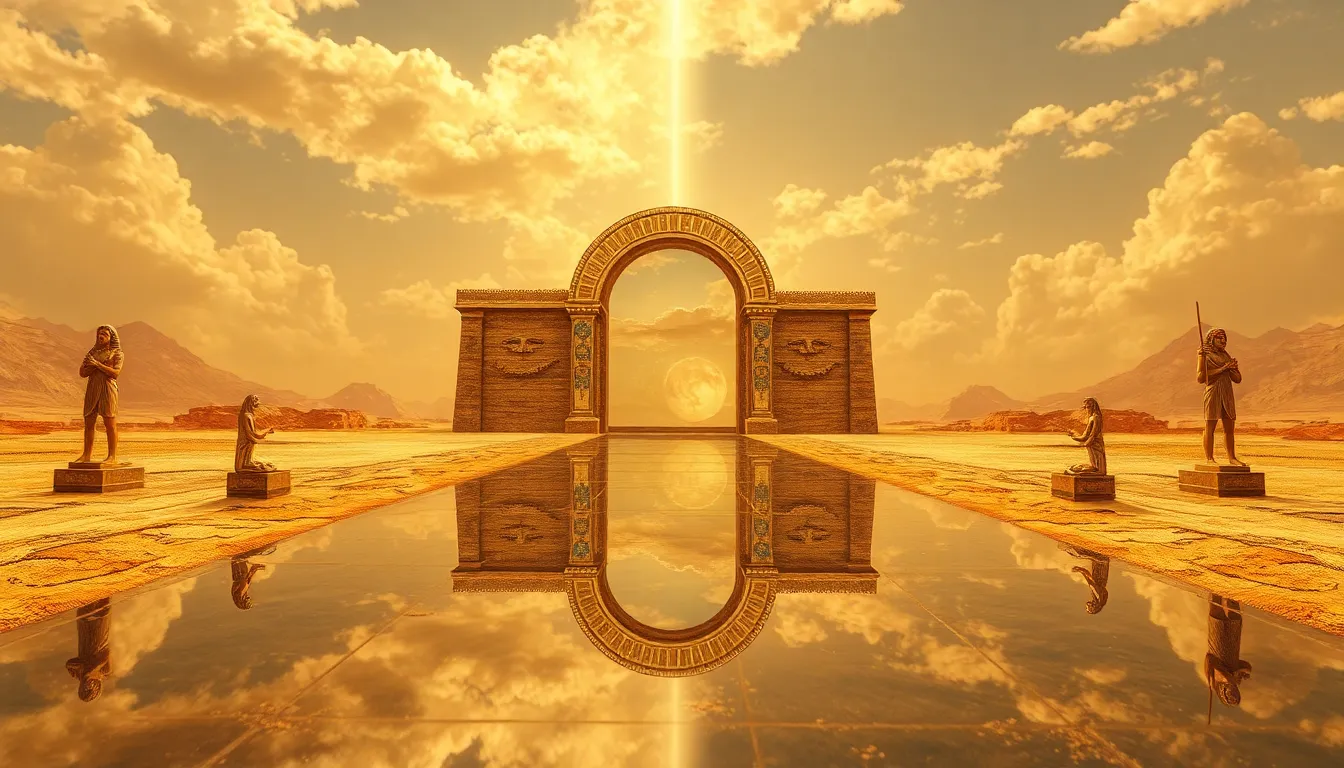The Legend of the Divine Mirror: Reflection and Truth in Egyptian Mythology
I. Introduction
Egyptian mythology is a rich tapestry of stories, beliefs, and deities that shaped the culture and identity of ancient Egypt. This mythology not only provided explanations for natural phenomena but also established moral frameworks and societal norms. Among the many fascinating elements of this mythology is the concept of the Divine Mirror, a powerful symbol of reflection and truth.
Mirrors in ancient Egypt were not merely objects for vanity; they held profound spiritual significance. They were believed to offer a glimpse into one’s true self and the underlying truths of the universe. This article explores the multifaceted nature of the Divine Mirror in Egyptian mythology, its origins, its connection to truth, and its lasting legacy.
II. The Mythical Origins of the Divine Mirror
The origins of the Divine Mirror are deeply intertwined with Egyptian creation myths. In various accounts, the universe emerged from a primordial chaos, often symbolized by water. Mirrors, which can symbolize reflection and clarity, played a role in these myths as a means of understanding the self and the cosmos.
Mirrors were also associated with several gods and goddesses, reinforcing their significance in both daily life and spiritual practices. For example, Hathor, the goddess of love and beauty, was often depicted with mirrors, emphasizing her role in reflecting not only physical beauty but also inner truth.
The symbolism of reflection is crucial in the context of creation. Just as mirrors reflect what is in front of them, the creation myths suggest that the divine reflects upon itself to bring forth existence.
III. The Divine Mirror as a Symbol of Truth
In Egyptian culture, mirrors were closely linked to the concept of truth. The ancient Egyptians believed that truth and justice were paramount, embodied in the goddess Ma’at, who represented order and equilibrium. The Divine Mirror served as a metaphor for the pursuit of truth, reflecting the moral and ethical standards that governed society.
Numerous myths highlight the importance of truth and justice, illustrating how the Divine Mirror served as a tool for discerning right from wrong. For instance, during the weighing of the heart ceremony in the afterlife, a deceased person’s heart was measured against the feather of Ma’at. This pivotal moment emphasized the significance of truth and integrity in one’s life and the reflections of one’s actions.
The impact of the Divine Mirror on afterlife beliefs is profound, shaping the way ancient Egyptians viewed their existence and moral choices. A life lived in truth would lead to a favorable judgment in the afterlife.
IV. Key Deities and Their Connection to the Divine Mirror
Several key deities in Egyptian mythology are intrinsically linked to the Divine Mirror, each contributing unique aspects of reflection and truth.
- Hathor: As the goddess of love, beauty, and joy, Hathor is often depicted with mirrors, symbolizing her role in reflecting beauty and the deeper truths of love and connection.
- Thoth: The god of wisdom, knowledge, and writing, Thoth represents intellect and clarity of thought. He is often associated with the concept of reflection in terms of understanding and enlightenment.
- Ma’at: Central to the theme of truth, Ma’at embodies the principles of truth, balance, and order. Her role in the afterlife judgment process further solidifies the Divine Mirror’s connection to moral integrity.
V. The Role of the Divine Mirror in Rituals and Practices
Mirrors held a significant place in religious ceremonies and funerary rites throughout ancient Egypt. They were used not only as personal grooming tools but also as instruments for spiritual reflection and communication with the divine.
During religious rituals, mirrors were believed to facilitate connections with the gods, allowing worshippers to reflect on their own lives and seek guidance. For the deceased, mirrors served as portals, aiding their journey into the afterlife.
In everyday life, mirrors symbolized self-awareness and introspection, encouraging individuals to examine their actions and intentions.
VI. Artistic Representations of the Divine Mirror
In ancient Egyptian art, mirrors were depicted in various forms, often alongside representations of deities. These artistic portrayals serve as a testament to the significance of the Divine Mirror in cultural and spiritual contexts.
Artifacts such as bronze or polished stone mirrors have been discovered in tombs, illustrating their use in both life and death. The craftsmanship of these mirrors reflects the high value placed on beauty and truth in Egyptian society.
Over time, the symbolism of mirrors evolved within Egyptian artwork, reflecting changes in societal values and beliefs about the self and the divine.
VII. The Legacy of the Divine Mirror in Modern Culture
The influence of Egyptian mythology, particularly the concept of the Divine Mirror, persists in contemporary culture. Modern interpretations often explore themes of reflection, identity, and truth.
In literature, film, and art, the Divine Mirror serves as a metaphor for self-exploration and the quest for authenticity. Works inspired by Egyptian mythology frequently incorporate these themes, encouraging audiences to reflect on their own truths.
Today, the idea of a mirror as a tool for self-awareness resonates with many, highlighting the enduring relevance of ancient beliefs in contemporary life.
VIII. Conclusion
The Divine Mirror occupies a significant place within Egyptian mythology, symbolizing the intertwined concepts of reflection, truth, and moral integrity. Its origins in creation myths, its association with key deities, and its role in rituals underscore its importance in ancient Egyptian culture.
In a world where the pursuit of truth remains a universal endeavor, the legacy of the Divine Mirror serves as a reminder of the enduring power of reflection in understanding ourselves and the world around us.
Ultimately, the cultural and spiritual significance of the Divine Mirror continues to inspire and provoke thought, encouraging modern society to engage with its own truths and reflections.




